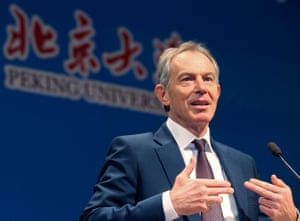'People will forgive you for being wrong, but they will never forgive you for being right - especially if events prove you right while proving them wrong.' Thomas Sowell
Search This Blog
Friday, 11 August 2023
Friday, 23 June 2023
Fallacies of Capitalism 14: Capitalism is Synonymous with Democracy
The "capitalism is synonymous with democracy" fallacy assumes a direct and harmonious relationship between capitalism, an economic system based on private ownership and market competition, and democracy, a political system characterised by representative government and citizen participation. However, this fallacy overlooks the potential conflicts that can arise between economic interests and democratic decision-making processes in several ways:
Power imbalances: Capitalism can lead to the concentration of economic power in the hands of a few wealthy individuals or corporations. These entities may exert disproportionate influence over political processes, such as lobbying or campaign financing, which can undermine the principles of equal representation and fair democratic decision-making. The resulting power imbalances can distort policy outcomes and compromise the interests of the broader population.
Influence of money in politics: Capitalist systems often allow for the infusion of large sums of money into political campaigns and lobbying efforts. This financial influence can create an uneven playing field, where economic elites can exert significant control over political agendas and policy outcomes. Democratic decision-making should ideally be based on the will of the people, but when economic interests heavily influence political processes, the voices and concerns of marginalised or less affluent citizens may be marginalised or ignored.
Regulatory capture: In capitalist systems, regulatory agencies are responsible for overseeing various sectors and industries to ensure fair competition and protect public interests. However, there is a risk of regulatory capture, whereby the regulated industries exert significant influence over the regulators. This can result in policies that favour the interests of powerful economic actors rather than promoting the broader welfare or democratic principles. Regulatory capture undermines the accountability and responsiveness of democratic institutions.
Inequality and political participation: Capitalism can exacerbate economic inequalities, which, in turn, can influence political participation. When wealth and income disparities are significant, certain groups may have greater resources and access to political power, while others may face barriers to participation. This can undermine the democratic ideal of equal political voice and representation, as marginalised groups or those with limited economic resources may be less able to engage meaningfully in democratic processes.
Conflicts of interest: Capitalist economies rely on profit-maximising behaviour, which may run counter to certain democratic goals. For instance, economic actors may prioritise short-term profits over long-term societal or environmental well-being. Democratic decision-making often requires considering broader societal interests, including sustainability, social justice, and the needs of future generations. Conflicts can arise when economic interests clash with democratic principles, potentially undermining the pursuit of collective well-being and the long-term interests of society.
Recognising the potential conflicts between economic interests and democratic decision-making processes is essential for maintaining a healthy balance between capitalism and democracy. It underscores the importance of robust institutions, transparency, campaign finance reform, and mechanisms to mitigate undue influence and power imbalances. By addressing these conflicts, societies can strive for a more equitable and inclusive democratic system that ensures broad representation and safeguards against the dominance of narrow economic interests.
Wednesday, 18 March 2020
Our politics isn’t designed to protect the public from Covid-19
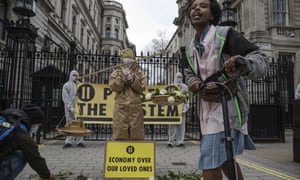
The worst possible people are in charge at the worst possible time. In the UK, the US and Australia, the politics of the governing parties have been built on the dismissal and denial of risk. Just as these politics have delayed the necessary responses to climate breakdown, ecological collapse, air and water pollution, obesity and consumer debt, so they appear to have delayed the effective containment of Covid-19.
I believe it is no coincidence that these three governments have responded later than comparable nations have, and with measures that seemed woefully unmatched to the scale of the crisis. The UK’s remarkable slowness to mobilise, followed by its potentially catastrophic strategy – fiercely criticised by independent experts and now abandoned – to create herd immunity, and its continued failure to test and track effectively or to provide protective equipment for health workers, could help to cause large numbers of unnecessary deaths. But to have responded promptly and sufficiently would have meant jettisoning an entire structure of political thought developed in these countries over the past half century.
Politics is best understood as public relations for particular interests. The interests come first; politics is the means by which they are justified and promoted. On the left, the dominant interest groups can be very large – everyone who uses public services, for instance. On the right they tend to be much smaller. In the US, the UK and Australia, they are very small indeed: mostly multimillionaires and a very particular group of companies: those whose profits depend on the cavalier treatment of people and planet.
Over the past 20 years, I have researched the remarkably powerful but mostly hidden role of tobacco and oil companies in shaping public policy in these three nations. I’ve seen how the tobacco companies covertly funded an infrastructure of persuasion to deny the impacts of smoking. This infrastructure was then used, often by the same professional lobbyists, to pour doubt on climate science and attack researchers and environmental campaigners.
I showed how these companies funded rightwing thinktanks and university professors to launch attacks on public health policy in general and create a new narrative of risk, tested on focus groups and honed in the media. They reframed responsible government as the “nanny state”, the “health police” and “elf ’n’ safety zealots”. They dismissed scientific findings and predictions as “unfounded fears”, “risk aversion” and “scaremongering”. Public protections were recast as “red tape”, “interference” and “state control”. Government itself was presented as a mortal threat to our freedom.
Their purpose was to render governments less willing and able to respond to public health and environmental crises. The groups these corporations helped to fund – thinktanks and policy units, lobbyists and political action committees – were then used by other interests: private health companies hoping to break up the NHS, pesticide manufacturers seeking to strike down regulatory controls, junk food manufacturers resisting advertising restrictions, billionaires seeking to avoid tax. Between them, these groups refined the justifying ideology for fragmenting and privatising public services, shrinking the state and crippling its ability to govern.
Now, in these three nations, this infrastructure is the government. No 10 Downing Street has been filled with people from groups strongly associated with attacks on regulation and state intervention – such as Munira Mirza, who co-founded the Manifesto Club; Chloe Westley from the TaxPayers’ Alliance; and of course Dominic Cummings, who was hired by Matthew Elliott, the founder of the TaxPayers’ Alliance, to run Vote Leave.
When Boris Johnson formed his first government, the Institute of Economic Affairs (IEA), which has been funded by the tobacco industry, boasted that 14 of its frontbenchers, including the home secretary, the foreign secretary and the chancellor, were “alumni of IEA initiatives”. The foreign secretary, Dominic Raab, has published one book and launched another through the IEA, which he has thanked for helping him “in waging the war of ideas”. The health secretary, Matt Hancock, in a previous role, sought to turn an IEA document into government policy. He has accepted significant donations from the organisation’s chairman, Neil Record. The home secretary, Priti Patel, was formerly a tobacco lobbyist. One in five new Conservative MPs have worked in lobbying or public relations for corporate interests.
Modern politics is impossible to understand without grasping the pollution paradox. The greater the risk to public health and wellbeing a company presents, the more money it must spend on politics – to ensure it isn’t regulated out of existence. Political spending comes to be dominated by the dirtiest companies, ensuring that they wield the greatest influence, crowding out their cleaner rivals. While nobody has a commercial interest in the spread of coronavirus, the nature and tenor of the governments these interests have built impedes state attempts to respond quickly and appropriately.
Brexit (remember that?) could be interpreted as an effort to bridge the great split within the Conservatives, caused by the rising power of dirty money. The party became divided between an older, conservative base, with a strong aversion to novelty and change, and its polar opposite: the risk-taking radical right. Leaving the European Union permits a reconciliation of these very different interests, simultaneously threatening food standards and environmental protections, as well as price controls on medicines and other crucial regulations, while raising barriers to immigration and integration with other nations. It invokes ancient myths of empire, destiny and exceptionalism while potentially exposing us to the harshest of international trade conditions. It is likely further to weaken the state’s capacity to respond to the many crises we face.
The theory on which this form of government is founded can seem plausible and logically consistent. Then reality hits, and we find ourselves in the worst place from which to respond to crisis, with governments that have an ingrained disregard for public safety and a reflexive resort to denial. When disasters arrive, its exponents find themselves wandering nonplussed through the wastelands, unable to reconcile what they see with what they believe. Witness Scott Morrison’s response to the Australian fires and Boris Johnson’s belated engagement with the British floods. It is what we see today, as the Trump, Johnson and Morrison governments flounder in the face of this pandemic. They are called upon to govern, but they know only that government is the enemy.
Friday, 29 April 2016
Tony Blair: the former PM for hire
Emails show oil firm questioned complex structure of Blair’s company, and reveal his closeness to Chinese leadership
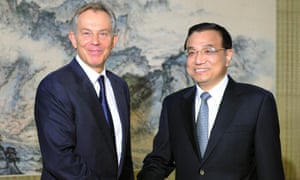
When Jonathan Powell, the gatekeeper to the corporate empire of Tony Blair, sat down to lunch with the former Saudi intelligence chief Prince Faisal Al Turki in June 2010 he could not have known how lucrative it would turn out to be for the former British prime minister.
As the high-profile mediator of the stuttering peace process in the Israeli-Palestinian conflict, Blair had to be careful not to mix business with pleasure. However, one of those lunching with Powell at the annual “global mediator’s retreat”, organised by the Norwegian Ministry of Foreign Affairs, was looking to make a deal.
--------
-----
Nawaf Obaid, a security analyst who accompanied Prince Faisal, emailed Powell a week later, according to documents seen by the Guardian, with a suggestion to work with his brother Tarek’s company, PetroSaudi, which he “co-founded and co-owns with Prince Turki bin Abdullah, son of King Abdullah”.
“They have several projects that [they] are working [on] and I think it would [give] a very interesting perspective to see if we could establish a strategic partnership with former PM Tony Blair and yourself,” he wrote.

Tarek Obaid was a former banker who styled himself as an adviser to members of the Saudi royal family and a director of a joint venture with Malaysia’s multibillion-dollar development fund, 1MDB. This fund had put $300m through PetroSaudi and as the latter’s chief executive, Obaid was on the lookout for deals.
On paper PetroSaudi looked impressive: its chief investment officer was a former Goldman Sachs banker, Patrick Mahony. The chief operating officer was listed as Rick Haythornthwaite, a City insider who was also chairman of Network Rail and MasterCard.
Blair’s team sold the former prime minister as someone who could help “unlock situations which might otherwise be blocked by political factors” in places such as China and Africa. PetroSaudi was interested in Beijing’s appetite for oil and how Blair’s firm could help.
The role assumed by Blair shows his influence in one of the most important areas of global economic cooperation this century: between the oil sands of the Middle East and hydrocarbon-hungry China.
While in office, Blair oversaw the handover of Hong Kong to China, but visited the latter just five times. His sixth visit in 2007 – when he earned £200,000 for a speech in the industrial city of Dongguan – marked a turning point in how he viewed the rising power.
Since then Blair has been back two dozen times and has built a reputation for befriending the rising stars of Chinese politics. In March 2010 he secured a meeting with Li Keqiang, now China’s premier.
PetroSaudi signed up Blair’s team to lobby Beijing in the summer of 2010 and internal PetroSaudi correspondence reveals there were questions raised about the apparently opaque nature of Blair’s businesses and the role he could play.
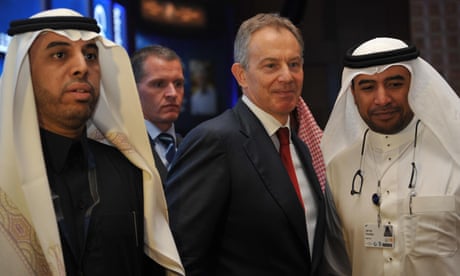
Tony Blair courted Chinese leaders for Saudi prince's oil firm
PetroSaudi executives warned in early September 2010 that they had “no contractual nexus with TB” and were anxious about “the lack of apparent employment or other involvement of TB in the corporate structure”.
To convince PetroSaudi that if it paid it would get Blair, his executives revealed for the first time how his complex web of companies worked. Blair’s businesses are split into two wings: Firerush, which was governed by the then City regulator the Financial Services Authority, and Windrush, which was not.
What bothered PetroSaudi was that it was paying roughly $55,000 to Firerush and about $10,000 to Windrush. Both firms trade as Tony Blair Associates (TBA).
From early on in their relationship PetroSaudi executives admitted they knew “very little” about Blair’s firms. In an email in August 2010, the company’s executives said they “would like to understand more about the structure and the relationship between Firerush, TB Associates and TB. In particular, the engagement letter mentions the provision of services by employees of Firerush which seems, like a number of concepts in the engagement letter, inappropriate given we are only looking to engage with TB.”
To allay concerns in November 2010, Varun Chandra, a former Lehman Brothers banker and director of TBA, told PetroSaudi that Blair was the “ultimate owner of all this and owns all the share capital” of all the companies. He told PetroSaudi it was not relevant which company got paid “given where the cash ultimately ends up”.
Chandra explained that Firerush executives handled the day-to-day conversations about “specific opportunities and making the arrangements to drive negotiations forward. Tony, procured by Windrush, is involved at higher level but on an ongoing basis, meeting with senior political leadership and business heads in order to discuss PetroSaudi at a strategic level and to speak highly of your management.”
PetroSaudi, he said, had already seen the benefit as “the man in charge of China’s economic policy is now supportive of working with PetroSaudi, and … he has spoken with CNPC [China National Petroleum Corporation] to ensure a proper working dialogue”.
By November 2010 TBA was hired and, according to the documents, Blair had found time to put PetroSaudi’s case to Lou Jiwei, the then chairman of the China Investment Corporation and now the nation’s finance minister.
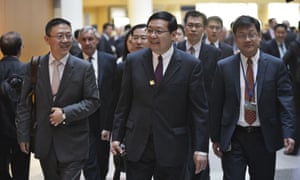
Lou Jiwei, centre, arrives for a G20 finance ministers’ and central bank governors’ meeting at the IMF on 15 April. Photograph: Mandel Ngan/AFP/Getty Images
Questions could be raised about why Blair was allowed to promote the interests of the son of the then ruler of Saudi Arabia in China while also working as the Middle East peace envoy for the Quartet – the US, UN, EU and Russia. Blair had also faced criticism for halting a Serious Fraud Office inquiry in 2006, while prime minister, into alleged corruption over a multibillion-pound arms deal with Saudi Arabia. He denies any conflict of interest.
PetroSaudi had made it clear it wanted to hire Blair. In an internal 2010 document entitled “story for Blair”, PetroSaudi sold itself as a “vehicle of the Saudi royal family” that could count on the “full support from the kingdom’s diplomatic corps” and was set up by Prince Turki bin Abdullah and Obaid, who hailed from a “prominent business family”.
PetroSaudi’s pitch in the document was that it claimed “many countries will get a company in but then bully it around once it is there and has sunk billions of dollars in the ground. This will not happen with [PetroSaudi] because these nations do not want to get on the wrong side of the Saudi royal family.”
But access to the legendary Blair contacts book does not come cheap. In July TBA’s then chief operating officer, Mark Labovitch, emailed Mahony to say he had “discussed your strategy and objectives with Tony and believe strongly that we can add value to PetroSaudi’s business development … We would propose a retainer fee of $100,000 per month.”
The documents reveal that even before Blair’s company was hired, he was already promoting the oil firm. In late July 2010 Blair was in Shanghai to celebrate the planting of 1m trees in north-west China to combat climate change. A few days later, Labovitch emailed the London-based oil firm to say: “Tony has just been in China and informally sounded out a number of people.”
Tarek Obaid and Blair did meet privately in early July 2010, and apparently discussed a working relationship. A month later Blair’s company was on a retainer fee of $65,000 and a “success fee equal to 2%” of any deal that TBA brought to the company – which PetroSaudi admitted could “potentially be a very large sum”.
In the following months a picture emerges of corporate bonhomie underwritten by spiky internal exchanges over the cost of hiring the former prime minister, his apparent obsession with privacy and a whirl of phone calls with global leaders.
By August 2010, according to documents, PetroSaudi raised concerns internally that TBA’s proposed contract was “more appropriate to an investment bank (eg they can record our phone calls)”. In an email, Mahony described the contract offered by Blair’s lieutenants as “a very aggressive first draft with almost total limitation of liability for TB”. He wrote: “I should note that the aggressive starting position of his engagement letter most probably is cynically reliant on counterparties taking a passive approach to secure his services.”
But at the end of the month Blair was in the Chinese capital for the signing of a partnership agreement between Peking University and his Faith Foundation, and managed to squeeze in some time with the Chinese oil giants CNPC and China National Offshore Oil Corporation, as well as China’s supreme economic council, the National Development and Reform Commission.
“The latter effectively ‘blessed’ your engagement with Chinese companies, and the former were both very keen to meet you and work out how you might collaborate,” Blair’s then chief operating officer told PetroSaudi. “We clearly articulated the benefits of partnership with you to them, which they grasped immediately.”
In November, Blair was back in Beijing to give a speech for his Faith Foundation. He also had a meeting with China’s vice-premier, Wang Qishan, who Blair’s firm told PetroSaudi was “crucial – inter alia in order to highlight the wider benefits of a partnership with PetroSaudi in terms of putting Chinese companies in pole position for Saudi infrastructure tenders”. Wang is now a member of the Chinese Communist party’s politbureau, the country’s highest decision-making body.
Blair’s relationship with PetroSaudi appeared to give him access to the Saudi elite. In December 2010 an executive of PetroSaudi said the company could arrange a dinner for Blair with Prince Turki. Blair’s office say this never took place.
The next month Blair’s office emailed PetroSaudi because he was keen to meet the King of Saudi Arabia and Prince Bandar, the secretary general of the country’s national security council, before the February 2011 Quartet meeting to discuss Middle East peace after the Egyptian revolution.
